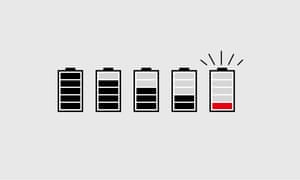My battery has died – anyone got a spare charger? It’s a cry with which most of us with a phone, laptop, or even an electric car, can sympathise. The mild but persistent irritation of a phone fading to black when you most need it. The never-ending pursuit of plug sockets. The sinking feeling when you realise you’ve picked the only train carriage with no power. The conflicting advice on how to prolong the life of your ever-sickening battery combined with the dark knowledge that it will die in a few years anyway. The nightly routine of charging your phone before bed.
“The issue with existing batteries is that they suck,” Elon Musk, chief executive of Tesla, said in May at the launch of the Powerwall, a sleek new battery. It’s a mystery up there with dark matter and the question of why you still can’t buy a toaster that browns both sides of the bread equally: why do batteries suck?
“It comes down to a fundamental problem,” says professor Clare Grey of Cambridge University’s department of chemistry, who has been studying how batteries function for almost 20 years. “You have a chunk of material and can only get so many electrons in and out of it. It’s not the case that if these silly scientists would just get on with it we would be able to increase battery power ad infinitum.”
So batteries don’t suck; our expectation of them is too high? “You might as well ask the iPhone user why they have to eat food three times a day,” Grey laughs. “It is inherent to any device that it uses a lot of energy. Most of us are charging our phones 365 times a year. That’s asking a chemical reaction to be perfect up to 1,000 times in a row. How many things in life go back and forth 1,000 times without deteriorating?”
In Vancouver, Isidor Buchmann, chief executive of Canadian company Cadex Electronics, agrees. The limitation of batteries is their chemical base. His company, which manufactures chargers and analysers and runs an online Battery University, is more interested in improving existing batteries. “Everybody wants to invent the so-called ‘super battery’ but the problem is that the battery ages like we do,” he says. “Even an athlete slows down. So it’s important to track its performance while it’s in service. The world is only interested in batteries from birth to graduation. Work to retirement is being ignored.” Next year, Buchmann plans to travel the world and “preach about how to care for batteries”.
Meanwhile, portable electronics get lighter, cheaper, and double in power every few years. The iPhone 6s has a 3D touch screen and ultrabooks are thin and powerful. A new smartwatch has more computing power than the Apollo moon landing spacecraft. The lithium-ion batteries they run on, however, haven’t changed that much since Sony started selling them in 1991. You still can’t drive an electric car from London to Edinburgh on a single charge (unless you have £55,000 to spare for a Tesla S).

EmoticonEmoticon